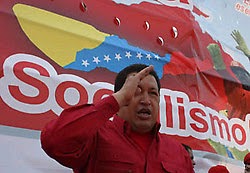(First published in Sinhala and dated 22 May 2007)
“We will no longer have to go to Washington nor to the IMF nor to the World Bank, not to
anyone,” declared Hugo Chavez, when he recently announced Venezuela’s
decision to leave the International Monetary Fund and World Bank (WB).
Once again Chavez underlined his
ability to stun and enrage the US
government while inspiring critics worldwide of these Washington DC
based international financial institutions.
The IMF and WB in alliance with the
US Treasury have pushed developing countries to adopt neo-liberal (or
‘Washington Consensus’) economic policies that are harmful to the living
standards and social welfare of the poor and marginalised.
The United States has a greater voting
share within these organisations than all poor countries combined.
In Venezuela itself, back in 1989, these
austerity measures led to a sharp rise in the price of essential commodities,
fuel and public transport, sparking riots in Caracas (Caracazo) in which 300 were killed.
Thus Chavez ensured soon after
election in 1999 that outstanding loans from the IMF were repaid and recently
repaid its debt to the World Bank in full allowing it to freely exit from these
institutions.
The Ecuadorean government of Rafael
Correa has been following in Chavez’s footsteps. It too has repaid in full its
loans from the IMF.
Correa also asked the World Bank’s
Country Representative to leave Ecuador
complaining of “extortion by this international bureaucracy”, following
pressure from the Bank to use oil revenues for debt service repayments instead
of social spending.
Daniel Ortega, Nicaragua’s
President, has announced his intention to escape from the “prison of IMF debt”
by also withdrawing from the IMF.
The Argentine government too has
been trying to repay all IMF borrowings ahead of schedule to free itself from
the crippling conditionalities attached to these loans that undermine economic
recovery and human development centred growth.
These developments in Latin America call into question the legitimacy and
relevance of these institutions.
Chavez proposes a ‘Bank of the South’
(Banco del Sur) for Latin
America that supports development and gives government greater
policy space, predicting that “sooner or later [the IMF and WB] will fall due
to their own weight”.
Although initially conceived as a
Latin American bank, such an institution would be an influential alternative to
neo-liberal hegemony around the planet.


No comments:
Post a Comment
Note: only a member of this blog may post a comment.